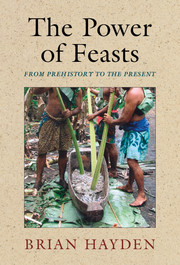Book contents
- Frontmatter
- Contents
- List of Figures
- Acknowledgments
- 1 Before the Feast
- 2 Food Sharing and the Primate Origins of Feasting
- 3 Simple Hunter/Gatherers
- 4 Transegalitarian Hunter/Gatherers
- 5 Domesticating Plants and Animals for Feasts
- 6 The Horticultural Explosion
- 7 Chiefs Up the Ante
- 8 Feasting in Early States and Empires
- 9 Industrial Feasting
- References Cited
- Index
7 - Chiefs Up the Ante
Published online by Cambridge University Press: 05 October 2014
- Frontmatter
- Contents
- List of Figures
- Acknowledgments
- 1 Before the Feast
- 2 Food Sharing and the Primate Origins of Feasting
- 3 Simple Hunter/Gatherers
- 4 Transegalitarian Hunter/Gatherers
- 5 Domesticating Plants and Animals for Feasts
- 6 The Horticultural Explosion
- 7 Chiefs Up the Ante
- 8 Feasting in Early States and Empires
- 9 Industrial Feasting
- References Cited
- Index
Summary
Ah, the glorious ancestors – Endless their blessings,
Boundless their gifts are extended . . .
We have brought them clear wine; They will give victory.
Here, too, is soup; well seasoned, Well prepared, well mixed
– From Waley 1996:319Although the term, “chief,” has a long history of use in the English language designating persons of authority, the concept of a “chiefdom” is a relatively recent development in anthropology. Oberg (1955:477,484) seems to be the first to have used the term to describe regionally integrated tribes under higher authorities in the lowlands of South and Central America. In his definition, he emphasized the paramount chiefs who controlled districts and other villages via a hierarchy of subordinate village chiefs who had judicial powers to settle disputes, punish offenders, and requisition men and supplies for war (although they lacked permanent armies). Oberg also insisted that surpluses were necessary for political development (in particular chiefdoms) together with class stratification. Service (1962, 1971:134,144–5, 159), Fried (1967:117), and Sahlins (1958) picked up this concept and redefined it so that in their definitions the core function of the chiefdom organization, and the basis of chiefly power, became economic redistribution (see Figure 7.1).
There have been other views on the fundamental nature of chiefdoms so that defining chiefdoms can become contentious. Moreover, there is considerable variation between chiefly societies in size, power, privileges, and other characteristics. However, the concept of a level of sociopolitical complexity intermediate between transegalitarian societies (with independent villages) and full-blown states (with multilevel political hierarchies, standing armies, and urban centers) is a useful one for research purposes. From my perspective, I find definitions of chiefdoms that stay close to Oberg’s original concept to be the most useful for archaeologists (see H. Wright 1977, 1984; D. Anderson 1994a:5–6; Junker 1999:66).
- Type
- Chapter
- Information
- The Power of FeastsFrom Prehistory to the Present, pp. 233 - 295Publisher: Cambridge University PressPrint publication year: 2014



